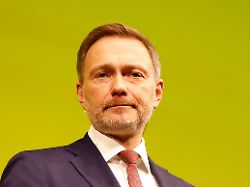RTL/ntv trend barometer
FDP slips below 5 percent, AfD remains on top
January 9, 2024, 2:09 p.m
In the first RTL/ntv trend barometer of the new year, the FDP and the Union each lost one point, which particularly hurt the Free Democrats. The SPD, on the other hand, gained one point, but remained well behind the AfD, whose high continued at the beginning of 2024.
The new year is starting as difficult for the traffic light parties as the old one ended: While farmers’ protests everywhere highlight the frustration – not only – of farmers with the government coalition, the poll numbers also remain at rock bottom: the SPD, Alliance90 have a combined approval rating of 33 percent /The Greens and FDP are just three points ahead of the CDU and CSU. The year is off to a bitter start, especially for Federal Finance Minister Christian Lindner’s party: the FDP has slipped below the 5 percent mark. Things have only been this bad for the party once since it came into government – in mid-October last year. The AfD, on the other hand, has had at least 20 percent approval for the sixth month in a row.
If the Bundestag were to be elected this week, the parties could expect the following result: CDU/CSU 30 percent (federal election in September 2021: 24.1 percent), AfD 22 percent (10.3 percent), SPD 15 percent (25.7 percent). percent), Greens 14 percent (14.8 percent), FDP 4 percent (11.5 percent), Left 4 percent (4.9 percent), Free Voters 3 percent (2.4). 8 percent of voters would choose other parties. Compared to the trend barometer before Christmas, the SPD and the Left gained one point, while the Union, AfD and FDP each lost one point.
When asked about the Chancellor’s preference, the possible top candidates of the Greens, Federal Economics Minister Robert Habeck and Foreign Minister Annalena Baerbock, give in: Compared to Federal Chancellor Olaf Scholz and CDU leader Friedrich Merz, Habeck scored 15 percent, three points less than in the week before Christmas . Scholz is still at 15, Merz remains unchanged at 24 percent. Baerbock slips two points to 15 percent. Scholz also loses in this triad: the Chancellor falls from 17 to 15 percent, while Merz continues to get 27 percent. The Union faction leader is still clearly the most popular among the likely candidates for chancellor.
There is also movement in the attribution of political competence: the Union falls by two points from 18 to 16 percent, the SPD increases by one point to 7 percent. 7 instead of 8 percent of those surveyed now trust the AfD to be the most likely to solve Germany’s problems. The Greens gained one point here and also went up to 7 percent. The FDP again ends up at 2 percent, while the proportion of those who don’t think any party can do that increases by one point to 58 percent.
When it comes to the topics that people are most interested in during the survey period from January 2nd to 8th, the war in Ukraine remains in first place with 36 percent mentioned, followed by the floods with 29 percent. The Middle East conflict follows with 27 percent and the issues surrounding the federal government with 25 percent. The economic situation was mentioned by 22 percent of those surveyed and the budget crisis by 11 percent.
The data for the RTL/ntv trend barometer was collected by the market and opinion research institute Forsa on behalf of RTL Deutschland between January 2nd and 8th. Database: 2502 respondents. Statistical margin of error: plus/minus 2.5 percentage points.
Further information about Forsa here.
Forsa surveys commissioned by RTL Deutschland.
